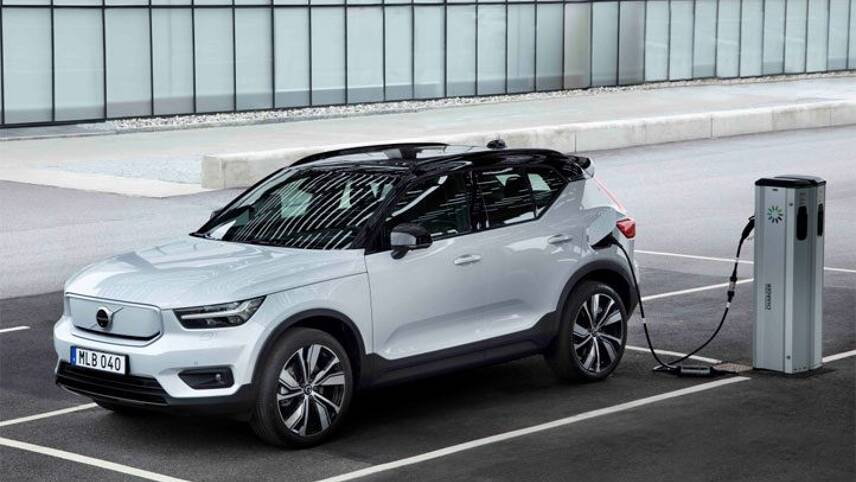Register for free and continue reading
Join our growing army of changemakers and get unlimited access to our premium content

Pictured: The Volvo XC40 Recharge
The firm’s chief executive Hakan Samuelsson announced the commitment this morning (2 March) as part of a sweeping update to its business strategy, that will also see sales shifted online.
Samuelsson admitted that electrifying Volvo’s entire car portfolio will require sweeping changes to product design processes and the infrastructure at manufacturing facilities. The brand launched its first fully electric car, the XC40 Recharge, on a global scale last year. It will unveil a second pure electric car model this week, also within the 40 series.
Volvo is aiming to phase out new petrol and diesel cars from its car portfolio by 2025, at which point it expects hybrids to account for 50% of sales and pure electric models to account for 50% of sales. It will then spend the next five years phasing out hybrids.
In a statement, the company said it was able to accelerate electric vehicle (EV) plans because of changing legislation and a “rapid expansion of accessible, high-quality charging infrastructure” in key markets. On the former, the UK has brought its ban on new petrol and diesel cars forward to 2030, and the EU is reportedly considering similar proposals. Volvo’s previous commitment was to ensure that pure electric and hybrid vehicles collectively accounted for at least half of global annual sales by 2025.
Samuelsson said: “To remain successful, we need profitable growth. So instead of investing in a shrinking business, we choose to invest in the future – electric and online. We are fully focused on becoming a leader in the fast-growing premium electric segment.”
Volvo’s chief technology officer Henrik Green added: “There is no long-term future for cars with an internal combustion engine. We are firmly committed to becoming an electric-only car maker and the transition should happen by 2030. It will allow us to meet the expectations of our customers and be a part of the solution when it comes to fighting climate change.”
Volvo has not yet confirmed investment plans to help it meet the new target, or any related proposals around changes to key facilities that could affect how its workforce is structured.
EV revolution
The news from Volvo comes just weeks after Jaguar Land Rover (JLR) announced a new business strategy headlined by a commitment to stop producing petrol and diesel vehicles under its Jaguar brand by 2025 and switch to electric-only models. Given that Jaguar only produces one pure-electric model at present and outsources production, the commitment marks a major shift for the firm.
New plans for Land Rover, meanwhile, will see the brand stop producing ICE vehicles for sale in the UK by 2030, in line with the Government’s ban on new petrol and diesel cars. Global production will then stop by 2036.
Ford has also accelerated its EV plans in recent weeks. On 17 February, the company announced plans to only sell pure electric passenger cars in Europe from 2030. It will stop selling pure petrol and pure diesel by 2026, then work to phase out hybrids.
With these announcements in mind, edie recently produced a feature summarising the portfolio electrification plans of the world’s largest carmakers. You can read that feature in full here.
Life-cycle impacts
The news from Volvo comes shortly after Transport and Environment published a new analysis of the life-cycle environmental impact of EVs, following claims in the media that they could produce more waste and emissions than their ICE counterparts.
The analysis revealed that resources used over the life-cycle of an ICE car are around 300 times higher than for a pure EV. While EV critics point to the need for battery materials like lithium and cobalt, they often forget the impact of extracting fossil fuels to power ICEs, the group argues.
This is not to say that sourcing sustainable materials for batteries, and ensuring that these materials stay in the circular economy, are not important challenges. The Transport and Environment analysis revealed that the average EV will produce 30kg of battery waste, as recycling infrastructure has not scaled up in line with increased production.
Some carmarkers are aiming to tackle this issue by investing in innovative recycling technologies and technologies that can improve supply chain practices, including blockchain. Many large brands are also exploring lighter batteries and cars that require less materials.
Time will tell whether there will be legal pressure on other firms to follow suit. The UK’s Resources and Waste Strategy could result in changes in this space, particularly given Boris Johnson’s ambitions for scaling up EV battery production and charging infrastructure domestically.
Sarah George


Please login or Register to leave a comment.